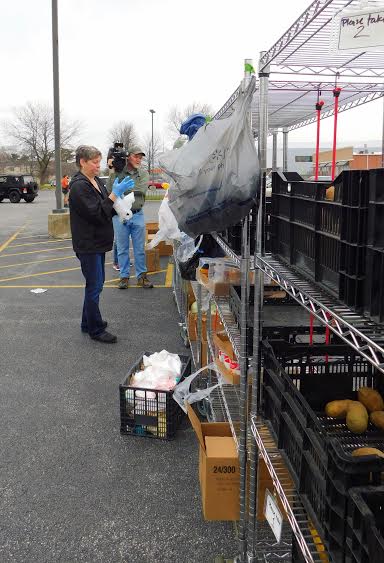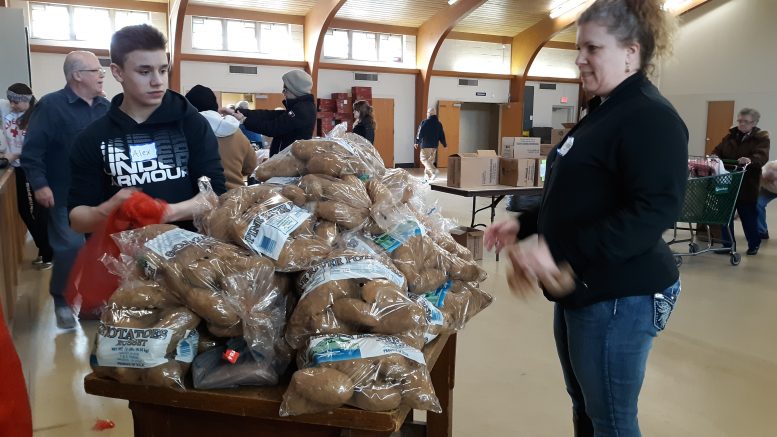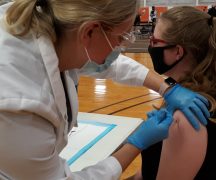By DAVID DUPONT
BG Independent News
The coronavirus pandemic is putting stress on food pantries.
That, said Sue Clanton, of United Way of Wood County, is the most critical issue. “The highest number of calls (to 2-1-1) are related to food insecurity.”
Information from pantries indicates demand is high, and as one pantry indicated much of that demand is from new clients.
The problems extend beyond supply of goods to distribute.
Clanton said that pantries are also short on volunteers. Many of those who typically work with them are older, and that puts them at higher risk if they contract COVID-19.

(Photo courtesy of Sue Clanton, United Way of Wood County)
Clanton said she stopped by the mobile food pantry recently held at the First United Methodist Church. She went to get some photos. Because of health concerns in her family, she wasn’t intending to volunteer, but she was pressed into service.
The United Way of Greater Toledo, the umbrella organization that covers Wood County, prominently asks for volunteers to help prepare and distribute meals. The United Way’s chief focus in Toledo is making sure school children are getting the nutrition they need, Clanton said.
In Wood County schools are working to meet that need.
The mobile food pantry is normally on campus in the library parking lot, but V Rosser of the BGSU Office of Public Impact wanted to move it to a location that was more visible and accessible to the general public. They hope to have the same arrangement for the next mobile pantry on April 22 from 2-4 p.m.
Though numbers were down slightly because so many students have left campus, they served more senior citizens and families with children.
The St. Aloysius food pantry reported that they have seen a “slight uptick” in the number of students they serve.
The Broken Chains Church, located at the Woodland Mall, reported “much higher need and more frequent visits.” In March they served 45 households. Typically, they’d serve fewer than 20. Many of those needing help were adults without children.
Food pantries are also having to adjust to the demands of social distancing . Most, Clanton said, have some sort of drive up service.
Brown Bag Food Project, 530 Sand Ridge Road, adopted a curbside delivery process from the start, said Amy Jeffers, assistant director. Brown Bag provides emergency food for families in need. They will get people often before they have had a chance to sign up and qualify for other services.
Jeffers said in the first week of the stay-at-home order they had people lined up for deliveries.
Those three nights they served more than two dozen families a night. In the weeks since then they’ve been averaging about 15 families, still more than usual. She attributes the dip that to other pantries expanding hours.
Brown Bag has made a point to let people know they don’t require a referral or paperwork to get food, and they serve people from throughout Wood County.
That’s important given, as Clanton noted, some areas in the county that are “food deserts.”
As many as half of those seeking help from Brown Bag are new to the service, Jeffers said.
Brown Bag volunteers have had to make a number of trips to Toledo to the Northwest Ohio Food Bank to make sure they had enough stock on hand to meet the demand.
With that increased need, Jeffers said, has come increased support from the community. Brown Bag has received increased food and monetary donations and a larger delivery from BGSU. One local baker even provided muffins and cookies.
Broken Chains reported to United Way that its funding has gone down 80 percent because The Fringe Thrift Store has closed.
Jeffers said they have maintained, and even increased, their core of volunteers. They adopted strict measures about being extra vigilant in cleaning and wearing gloves and masks.
The project provides food to a family every two months in most cases. While that has stayed the same, “we are looking at that little differently,” she said. “we’re realistic. We know people are in a position they need help especially now.”
Clanton said that pantries are particularly in need of personal hygiene items – soap, baby and adult diapers, toothpaste, feminine products, shampoo — and cleaning products. These cannot be acquired elsewhere and clients cannot use SNAP benefits to purchase them.
Brown Bag also provides some pet food.
Clanton said that the United Way of Greater Toledo is also establishing an emergency response fund. She said how that fund will be used has yet to be determined. United Way is waiting to see where the federal and state governments are going to focus their attention.
“They want to see where’s the greatest need.”





